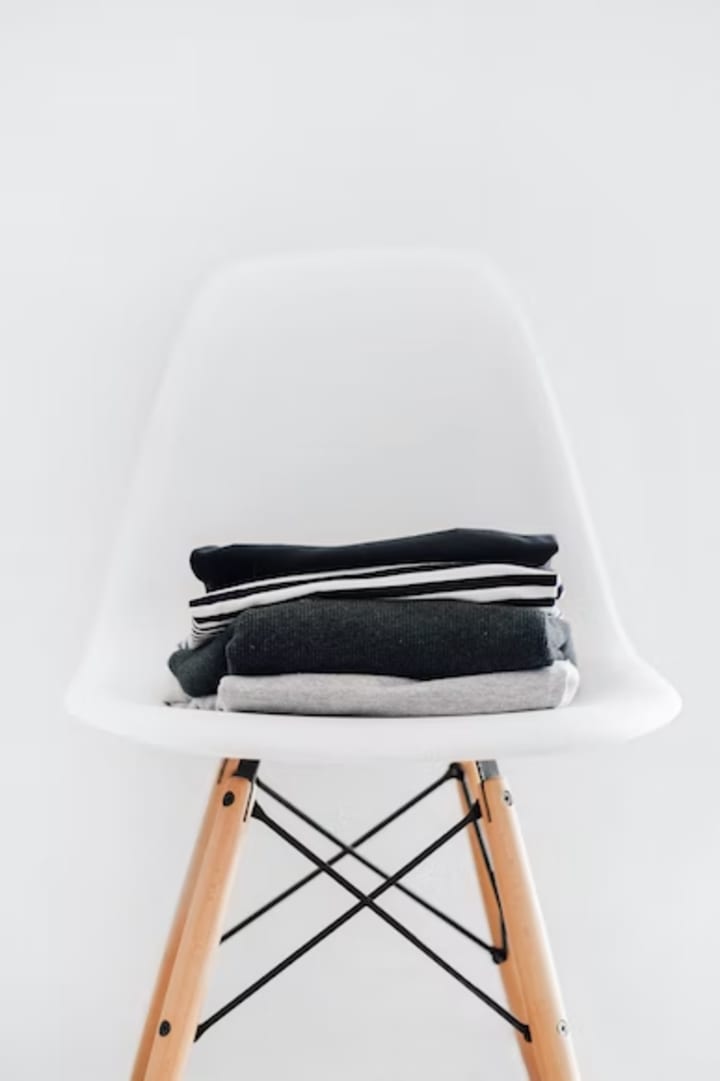The wildly popular used clothes recycling industry: just over 10,000 invested, 300,000 earned in 8 months
The frenetic used clothes recycling industry

At the end of August, Multi-Catcher sold used clothes that had been recycled for 75 yuan at a high price of more than 600 yuan, a price that had doubled eight times. The news hit Weirdo, with some citizens suggesting that the profitable premiums paid by Multi-Catch Fish were "unsightly".
The number of second-hand clothes that are sold at high prices is very small, and the fate of a large number of ordinary clothes is to be recycled "by the pound" and exported to Africa, Southeast Asia, and other countries.
The business opportunity of recycling second-hand clothes has already been seized upon by some with a keen business sense. In addition to the "white whale" used clothes recycling app (which also has an app of the same name), which became popular in 2020, the industry is more of a "scattergun" business - one person, one cart, one and warehouse can start a business. One person, one truck, one and warehouse can start a business. In most people's eyes, it's an industry with few skills and few barriers.
According to the 'Entrepreneurial Front line', a boy in his 00's made a profit of 170,000 yuan in his first year in the business, and another entrepreneur in his 80 s m 80 roves 300,000 yuan in 8 months.
However, second-hand clothes recycling is not only an opportunity for some people to start a business from scratch but also a scythe used by some people to "cut the leeks". Some upstream sorting factories or larger recycling companies use the name of joining and training to cheat newcomers.
The two very different sides of the industry reveal the profiteering and chaos of the used clothes recycling industry.
1. Low-threshold business
"Young man why collect rags, find a class on how good?" This is to do old clothes recycling for more than a year, Zhang Yang heard the most words.
In the eyes of the grandparents, sitting in the office work is decent and profitable, and recycling old clothes is what the elderly do things. In the face of their doubts, he chose to smile and dislike back, "then your daughter earns more, do not worry about it". These people cannot be offended, they are potential KO s in the community, and Zhang Yang is counting on them to help spread the word.
The 23-year-old Zhang Yang has had many jobs, webmaster service student, a general worker in an electronics factory, customer service, sales, and so on. The reason why he got into the used clothes recycling industry was a misguided chance - one day he overheard someone recycling used clothes and went to learn about the industry out of curiosity.
"The cost is low, and even if you lose money, you won't lose much." This was his first thought about the business, and the main reason he dragged his friend into it.
The threshold for the old clothes recycling business is extremely low - one person, one truck, and one warehouse are all that is needed. Chen Lin from Jilin province bought a second-hand van for a few thousand dollars and rented a warehouse for half a year before entering the business, with a total investment of more than 10,000 yuan.
Zhang Yang at first did not even buy a van, only spent two or three thousand dollars to buy a battery truck, which is the largest investment. Their warehouse was chosen in the partner's rural home, free of charge. In addition, he also prepared some snakeskin woven straps, five or six yuan each, several elastic bands used to tie up goods, generally three or four yuan a piece, and a handheld electronic scale bought from Taobao for 30 yuan.
Overall, Zhang Yang's cost of entry into the industry was just over 3,000 yuan.

He told us that another reason for joining the business was that he was not used to being disciplined, doing a 9 to 6 job like a robot, day after day, year after year. Compared to a sales job, the advantage of running your own business is that there is not much pressure to perform and it is more comfortable.
However, after working in the recycling business for a long time, Zhang Yang fell into another repetitive process. Nowadays, he drives a second-hand van every day, going from street to street to collect second-hand clothes, and then sells them to upstream sorting manufacturers after a simple sorting process.
"There's nothing technical about this industry, it's hard-earned money." Zhang Yang said, "every day to get up early, moving goods pulling goods, regardless of the wind and rain to collect." If there is no lift in the district, dozens and hundreds of pounds of clothes have to be carried downstairs by themselves.
One of Zhang Yang's must-have items for recycling old clothes is a mask, which is used to prevent dust. "Don't underestimate the dust, I didn't pay attention at first and coughed for months."
Apart from the hard work in terms of physical labor, sometimes the part of collecting is not easy. Especially those who are new to the industry, they neither know how to recycle nor sort.
In the beginning, Chen Lin was embarrassed to pick carefully at the customer's home, and after taking them all back, he found that some clothes did not pass the test, "fortunately, the loss was not much a hundred or eighty dollars".
Sometimes, young people face some embarrassing moments when recycling used clothes.
In Africa, second-hand underwear is a sought-after item, sometimes costing more than new clothes. Driven by this demand, second-hand underwear has become a key cargo in the recycling chain.
When he first received his underwear, Zhang Yang, in his early 20 s, was embarrassed, "not daring to hold it in his hands, but only wrapping it in other clothes and deliberately avoiding looking at it." Because of the lack of careful inspection, he received a lot of substandard goods that can only be thrown away, but also because of this, he was not less spit on by the partners.
2、Earning 30,000 to 40,000 yuan a month
For front-line recycles, the essence of the business is to earn the difference.
"We recycle from individuals and the price per pound is between 20 cents and one yuan." Chen Lin said. After collecting them, they need to sort out the pilled, stained, and torn clothes, and then sell them to upstream sorting plants after sorting the old clothes by different categories.
The distribution channel for these second-hand clothes is mainly exported to Africa, so summer clothes are the most expensive and can be recovered by sorting plants for more than 7,000 yuan a tonne, while autumn and winter clothes like jumpers are only 500 or 600 yuan a tonne.
According to the market, this price fluctuates slightly up and down, and pricing varies from factory to factory. "We sell to whichever one has a higher price." Chen Lin told Entrepreneurial Front line, "After deducting costs such as space and labor costs, the net income per tonne is between 200 and 2,000 yuan."
Having been in the business for nearly two years, Chen Lin has come up with a more convenient way to make money - developing "subordinates", who receive the clothes, he collects them at a higher price and then sells them back to the manufacturers, equivalent to "second-hand dealers This is the equivalent of a "second-hand dealer".
This way, his profit margin is reduced, and the volume of goods received increases, but the overall income changes little, the biggest benefit is to save time and effort. With someone supplying him, Chen Lin can recycle an average of around 70 tonnes per month.
In a business that feeds on manual labor, the best reward for recyclings is a not-so-low income.
Chen Lin joined the business in April last year and by the end of the year had netted more than 300,000 yuan. In his first year in the business, Zhang Yang also received a share of 170,000 yuan.
Sorting manufacturers are also actively looking for recycling agents, and this business is even more lucrative in their mouths.
Wang Tong, a staff member of a sorting factory in Hebei, said that mature recycle receives around 10 tons of goods each month, and the comprehensive calculation is settled at an average price of 5,000 to 6,000 yuan per tonne. "Take away the cost, there is at least 4,000 yuan profit per tonne." At this rate, their recycles can make 30,000 to 40,000 yuan a month after some other costs are removed.
There is no trick to this business of recycling old clothes; the amount of money made is related to the number of collections. In order to increase the volume of collections, the recycles try every possible way to promote themselves.
Online, they post on social media platforms such as Idle fish, Transfer, and Little Red Book, and local customers can collect their goods at home, while overseas customers recycle by post. Offline, there are more diverse ways, for example, Chen Lin will shout with a loudspeaker in the community, hand out flyers and business cards, as well as post ads in housekeeping groups, where cleaning aunts can sell him old clothes when they have finished cleaning for their clients.
Zhang Yang will be free to send small cards in the community, "stuffed into the doorway or car, as long as it is not too frequent, people will not resent". In addition, recycle's are working with properties and courier stations to put recycling bins in the community.
"The used clothing recycling industry is still a blue ocean right now, with a large volume and little competition." This is how old clothes sorting manufacturers describe this seemingly frenetic industry.
Behind this conclusion, there are corresponding data and phenomena to back it up.
In 2013, statistics released by the China Resources Comprehensive Utilization Association showed that approximately 26 million tonnes of old clothes are thrown into the trash by consumers in China every year.
On the other hand, the current extremely low recycling rate of old clothes is one of the reasons why this industry has become a blue ocean. 2021 Waste Textiles Recycling Technology Exchange Conference, Pan Yong gang, Vice President and Secretary General of China Recycling Resources Recycling Association, revealed that the annual recycling volume of waste textiles does not exceed 10% of the output volume.
These data reveal that the used clothes recycling industry has huge room for development.
3, someone to "cut leeks"
Chen Lin feels that in the past two years, there has been more publicity about the industry on short video platforms such as Jitterbug and Racer, and many sorting manufacturers and recycling's have opened accounts.
To attract more people, some may deliberately raise the price of used clothing. For example, the price of recycling summer clothes at sorting factories is more than 7,000 yuan a tonne, and some people offer 10,000 to 20,000 yuan, "and when newcomers receive the clothes to send to the manufacturers, the other side then finds various reasons to suppress the price".
In this recently developed industry, we can smell a hint of "cut leeks".
The first way to "cut the leeks" is to sort manufacturers or larger recycling companies claiming to be open to joining, jointing them out of franchise fees.
"Some people may not even have their antilabor, just take you to a random plant to see, pure fraud." Chen Lin claimed.
Wang Tong revealed to "Startup Forefront" that their family's brand usage fee is 9,600 yuan, and if the recycle collects enough summer clothes for 10 tons, the fee is fully refunded, "We will provide a series of support for free in the early stage, and this money is equivalent to a deposit. For every 5 tons of goods received by the recycles, the manufacturer will send a car to pull the goods, logistics costs are all borne by the manufacturer."
Of course, not all manufacturers who charge are attempting to "cut the leeks", the specific need to enter the industry to judge for themselves.
Another way to "cut the leeks" is to cheat on training fees under the banner of "teaching newcomers to learn about recycling used clothes".
"The fees for these courses are usually a few thousand dollars to more than 10,000 yuan." Chen Lin said. The content of the teaching includes what kinds meet recycling standards, how to sort clothes and h, and how to find sorting manufacturers.
The basic requirements of the used clothes recycling industry are that they do not accept torn, stained, or dyed, as well as baby, children, and older clothes. On top of these requirements, each sorting plant has slightly different standards. "For example, in some sorting factories, shorts worn by girls can be counted as summer clothes, while some manufacturers can't." Chen Lin says. That's why he thinks it's really necessary to follow the manufacturers to learn about sorting systematically.
It is also true that this is the fastest way for newcomers to enter the industry, but the downside is that it is difficult to tell if the other side is reliable.
Regarding the need for training, Zhang Yang has a different view. "Do you still need to learn about sorting? If you go to a sorting plant and ask, you'll be able to sort it yourself."
Going to a sorting plant to discuss cooperation and find out their recycling prices and standards is another "stupid method". This was the approach that Chen Lin and Zhang Yang first adopted. The disadvantage of this approach is that it is slow and requires a process of transition from rust to skill.
Before joining the industry, Chen Lin spent three months learning about the industry, and only after receiving the goods did he contact the manufacturers, and also called the sorting factories one by one to find out what was going on.
Wang Tong said that in addition to teaching franchisees to sort clothes, they also provide information on how to advertise, how to talk to collection points about cooperation, and how to develop their secondary as.
"For example, if you develop your collection poi you can talk to scrap yards, bird stations, security guards, community properties, cleaning and the like." We, mg Tong said, in addition, they also provide materials such as car stickers, business card posters, easy to pull up, and other public, Ty.
But in fact, no training, and Wang Yang, has long been in preacher to figure out these ways of publicity, Chen Lin also developed the same subordinate agents.
These two attributes make people in the used clothes recycling industry "fast in, fast out". As more and more people enter the industry, Chen Lin feels that business is not as easy as before. Subsequently, he may also switch to other segments of the garment industry.
Another question that practitioners need to consider is how long can the industry of exporting used clothes to Africa last?
There are media reports, .n order to promote the development of the local textile industry, some African countries have proposed a few years ago to gradually stop importing used clothes and encourage "Made in Africa", such as Ethiopia is vigorously developing the textile and clothing industry, data shows that its exports of textile and clothing to the United States market in 2021 amounted to $261 million.
It remains to be seen what the future holds for the country's exported used clothing industry in terms of trends. Although from the current data, the second-hand clothes recycling industry may still be a blue ocean, practitioners must do a good job with Plan B, after all, no industry can let people "easily earn more than 10,000 a month", the risks and benefits have always been two sides of the coin.
About the Creator
yesenia neibart
I can't bear the burden of deep love, and words of love are only lies that are casually fulfilled.






Comments
There are no comments for this story
Be the first to respond and start the conversation.